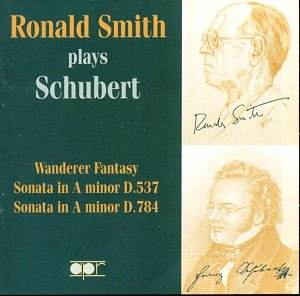The doyen of British pianists Ronald Smith has
reached the age of eighty. His now legendary status as an Alkan
exponent has not in any way diminished his status as an intellectually
challenging, digitally fluent musician whose unassuming exterior
conceals a commanding brilliance. He has always essayed the core
repertoire with great acuity and APR’s release brings us a relatively
new recording: from March 2002 comes the Wanderer Fantasy and
the two Nimbus recorded sonatas from 1986. APR in fact has a number
Smith’s discs in print – Alkan, of course, Liszt, Chopin and Beethoven.
This Schubert disc is one that delights, moves and, as important,
convinces. It convinces because of his sense of structural control
and it delights because of his acutely applied tonal variety.
There is a probing mind at work here, one that never has recourse
to dry academicism but, on the contrary, is constantly alive to
musical intricacy, inter relation and meaning.
The earlier of the two Sonatas in A, D537, receives
a performance that respects its classical proportions. I particularly
like the way Smith immediately conveys the avuncular confidence
of the writing in the opening Allegro and equally how he conveys,
by the subtlest of musical means, the shifting mood as we move
into the more brooding aspect of the second subject. He exaggerates
nothing here. Familiar from the posthumous A minor sonata, the
skeleton theme of the second movement in this earlier work – much
simpler and less adorned than it was to become – receives a performance
of daintier elegance. Smith’s fully rounded right hand tone catches
its playfulness and animation splendidly. Even more so in the
finale he never presses too hard, allowing a kind of naturalness
of line to unfold, as it were, of its own accord. But there is
as well with all this a specific sense of colouristic drama and
of space – he has a delicious sense of timing – that lends the
sonata a youthful but all embracing element. The Wanderer
was recorded in 2002. Without recourse to over-pedalling but with
sure and cogent architectural goals Smith traverses this mountain
peak of the literature with undimmed authority. Clarity and drive
animate the first movement as well as a sense of crispness and
rhythmic acuity. His power of tonal depth is best noted in the
Adagio where the sense of mysteriousness and stillness is conveyed
with maximum dramatic power. And through to the fugal drive of
the Allegro finale Smith’s athleticism, even at eighty or so,
and his decisive strength surmount most of the problems in his
path. And so with D784 - where he manages to convey the bleakness
implicit in the writing with a most remarkable fusion of reserve
and projection. The music’s transformative qualities are never
overstated in Smith’s performance, rather they are subsumed into
the syntax of his musicianship in a way both authoritative and
wise; this applies in particular to the Allegro giusto, which
bears the weight of the sonata’s theatrical extremes. Smith manages
here and indeed in the ultimately tragic finale to keep balanced
the binary oppositions Schubert embedded into the sonata. One
gets from a performance such as this the impression of a searching
mind still youthfully at the service of the music in a way that
elevates it still further.
Whilst the Nimbus originated recordings retain
that characteristic acoustic the Bristol Wanderer is much
more focused and natural in sound. All the performances reflect
Ronald Smith’s still formidable credentials as a Schubertian of
distinction.
Jonathan Woolf
